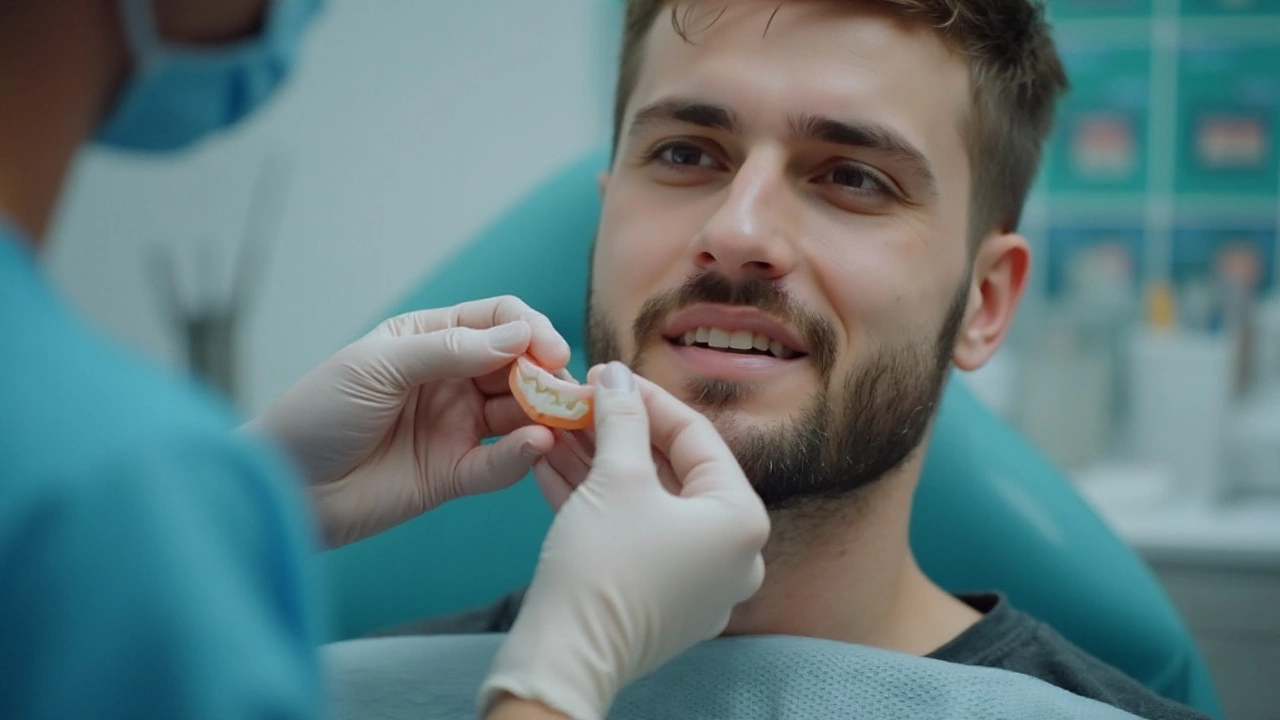Waiting for dental implants can understandably bring about anxiety, especially with the thought of gaps where teeth once were. Yet, rest assured, there are viable options that ensure you won't have to face the world toothless during this time.
Modern dentistry offers a surprisingly wide array of temporary solutions that cater to aesthetics and functionality, helping you maintain confidence and comfort as you transition to permanent fixtures. From temporary dentures to innovative immediate implants, choices are available to fit your needs and lifestyle.
This isn't merely about looking good, though. It's about maintaining oral health and comfort during a crucial phase of your dental journey. Let's explore some practical approaches that can make this waiting period not just bearable, but a seamless step towards that perfect smile.
- Understanding the Waiting Period
- Temporary Solutions for Aesthetic Concerns
- Maintaining Oral Health During the Interim
- The Role of Immediate Implants
- Caring for Your Temporaries
- Embracing Your New Smile
Understanding the Waiting Period
When it comes to getting dental implants, the journey isn't instantaneous. There's a waiting period involved, and understanding it can ease any concerns you might have about the process. So, why the wait? It all begins with the condition of your gum and bone structure where the implant will be placed. After a tooth extraction, your jawbone needs time to heal. The healing journey can vary depending on personal health factors, but typically this can take from a few months to over a year. During this time, the bone needs to regenerate and become solid enough to support the implant securely.
The key reason for this waiting is osseointegration. This is a biological process by which the bone fuses with the titanium implant. It's about creating a stable foundation for the crown that will eventually sit atop. A rushed job could mean an unstable tooth that could lead to future dental issues. Patience here is a critical virtue because a successful implant relies heavily on stable bone integration. The good news is that with steady advances in dental technology, the integration period has decreased, ensuring that teeth can be restored in a more time-efficient manner. That said, your dentist will keep a close eye on this process, conducting regular checks to confirm that everything is advancing as expected.
The Waiting Game Worth Playing
It's not just about medical necessities; there's also an artistic side to this pause. As you wait, your dentist may take several impressions and x-rays to design a perfectly fitting implant crown that matches the color and shape of your surrounding teeth. Meticulous planning makes sure that when your new tooth arrives, it feels and looks just right in your mouth. Meanwhile, there are options — like temporary dentures — that help maintain your social lifestyle without interruption. Many choose this path to keep flashing their smiles without reservation.
In some cases, immediate implants may be an option. This means placing an implant simultaneously with an extraction. It's not suitable for everyone, particularly if bone quality is insufficient or if there is infection. However, for those who qualify, it can be a rewarding avenue with potential to shorten the total treatment time significantly. It's a decision that requires careful consultation with your dental physician, thoroughly weighing the pros and cons based on your unique oral health scenario.
C. Gupta, a leading oral surgeon, said, "In some cases, immediate loading of implants can offer a quicker resolution to tooth loss. But it's essential for patients to understand the importance of preliminary bone assessment before proceeding."
This statement underscores the significance of individualized care in the dental world, encouraging us to see each treatment plan as much a personal art as it is a science. So, try to view this waiting time as an investment towards a lifetime of healthy smiles.
Temporary Solutions for Aesthetic Concerns
When faced with the prospect of having missing teeth during the waiting period for dental implants, it’s understandable to feel uneasy. Nobody wants to feel self-conscious while smiling, laughing, or even just speaking. Thankfully, the field of dentistry offers a variety of temporary measures that can help fill the gap both literally and aesthetically. One popular choice is temporary dentures, which are custom-made to fit snugly in your mouth. These can be complete or partial, depending on the number of teeth missing. Made from high-quality acrylic, temporary dentures not only help with appearance but also with basic functions like chewing and speaking. Another solution that has gained traction is dental flippers, which are a type of temporary partial denture. They're quite lightweight and easy to wear, providing an immediate solution to restoring that smile.
In some cases, dental professionals might recommend a temporary bridge. This is a prosthetic device glued onto the surrounding teeth to fill the space of the extracted tooth or teeth. Temporary bridges can be an excellent choice for those missing one or a small number of teeth, maintaining the natural appearance of the mouth. This solution is often chosen when the surrounding teeth require support to stay strong and aligned. On the other end of the spectrum, for those who are suitable candidates, immediate implants can be considered. These implants are placed right after the extraction of the tooth, minimizing the waiting period for permanent implants. Immediate implants provide a reliable solution for dealing with the gap in your smile while awaiting long-term options.
"An interim solution is crucial for patients awaiting dental implants to maintain their self-esteem and social engagement. A temporary measure isn't just a placeholder; it significantly enhances quality of life." - Dr. Sarah Thompson, Dental Surgeon.
Cost is invariably a significant consideration in making temporary dental solutions accessible to everyone. While options such as temporary dentures and dental flippers are often seen as more budget-friendly, it’s vital to consult with your dental professional to determine the best plan for your individual circumstances. Some dental practices offer payment plans or insurance coverage that can help ease the financial burden. Whatever the chosen solution, the main goal is to ensure that individuals are not left feeling vulnerable or hesitant to engage in their daily activities.
Choosing the Right Temporary Solution
Deciding on the appropriate temporary solution is essential, and several factors can influence this choice. Comfort and convenience are often at the forefront, along with cost and cosmetic considerations. Discussing these with your dentist can help you find the solution that best suits your lifestyle and needs. Installation and care for each type differ slightly; for instance, while temporary dentures and flippers can be removed and cleaned easily, a temporary bridge might require professional attention to adjust or remove. Each solution comes with its set of instructions to ensure that they are maintained and function optimally throughout this transitional period.
Many might wonder about the practicality of these temporary solutions—do they fit seamlessly with the lifestyle one is accustomed to? The truth is, after a short adjustment period, most people find them relatively easy to adapt to. Although they might feel slightly strange at first, with consistent wear, they become less noticeable. Practising good oral care habits even with temporary fixtures is crucial to avoid any gum irritation or infections. Brushing twice a day, flossing, and regular dental check-ups are simple yet effective ways to maintain oral health during this time, ensuring that one's path to a permanent smile stays on track.

Maintaining Oral Health During the Interim
Keeping your mouth healthy while awaiting dental implants is pivotal for a successful implant process. Oral hygiene is more than just a ritual; it's a foundation for ensuring your gums stay healthy and your future implants have the best chance of success. While the temptation to ease up during this waiting period seems strong, maintaining a regular cleaning routine helps ward off complications that might delay your treatment or cause discomfort.
Brushing twice a day with a soft-bristled toothbrush and fluoride toothpaste is a non-negotiable. This practice goes beyond merely cleansing the mouth; it helps to control plaque and bacteria, which can lead to gum disease. Flossing cannot be overlooked either, as it reaches those spaces between teeth and under the gumline that a toothbrush might miss. It’s these very gaps that, if neglected, can become a breeding ground for bacteria. If you're using temporary dentures, clean them daily to prevent bad breath and stains.
"Proper care during an interim period is integral. Negligence can be detrimental to the entire dental plan," notes Dr. Emily Collins, a well-regarded dentist based in Belfast. "It's not just about aesthetics, but the overall function and readiness of your mouth to accept implants."
Diet plays a significant role too. Consuming a balanced diet, rich in vitamins and minerals, strengthens your immune system, bolstering your body’s ability to heal and fend off infections. Avoiding sticky or overly hard foods prevents any undue stress on your existing teeth and gums. If wearing temporary solutions like dentures, be cautious with how your diet impacts their fit and cleanliness.
Regular dental check-ups during this time aren’t just recommended; they are crucial. Your dentist will monitor the condition of your mouth, ensuring that temporary solutions are comfortable and do not cause undue stress on gums or remaining teeth. They can also clean harder-to-reach areas, reducing the risk of gingivitis or other complications.
Handling Dental Emergencies
Though you hope emergencies don’t arise, knowing how to handle dental issues is calming. If sudden pain or issues with your temporary dentures occur, immediate attention prevents escalation. Your oral health journey is a partnership with your healthcare provider, ensuring issues are addressed with solutions tailored to your unique situation.In essence, this interim isn’t a pause in caring for your oral health; rather, it's a vital link in the chain of your dental transformation. With proper care, patience, and a commitment to your health, your wait for improved dental implants becomes less daunting and more of an opportunity to reaffirm your commitment to a healthier smile.
The Role of Immediate Implants
In the world of *dental implants*, immediate implants have gained recognition for their ability to transform smiles swiftly and seamlessly. But what exactly are these time-saving marvels? Essentially, immediate implants are placed directly after a tooth extraction, significantly reducing the waiting period for implant placement. They offer a unique blend of efficiency and immediate aesthetic appeal, allowing individuals to avoid the dreaded 'missing teeth' stage that many fear. This process is not merely about striking while the iron is hot, though; it entails thorough planning and requires a skilled dental professional to ensure success and avoid potential complications.
Immediate implants are particularly beneficial in situations where preserving bone structure is essential, such as in the front teeth where aesthetics are a key consideration. Their application sees a direct correlation to enhanced patient satisfaction, as they minimize the gaps in one's smile. According to a leading dental journal, "Immediate implants are revolutionizing patient care by enabling a faster transition from scheduled removal to a fully restored smile."
Carl Mish, a pioneer in implant dentistry, eloquently notes that "Immediate implants bridge the gap between lost confidence and regained elegance."Yet, it's crucial to keep in mind that not every case is suitable for immediate implantation. Factors like the presence of infection or insufficient bone volume can deter their successful application.
Beyond aesthetics, one cannot overlook the psychological benefits of immediate *dental implants*. Having teeth removed can be distressing, affecting both self-esteem and social interactions. Immediate implants offer a psychological safety net, providing instant reassurance. Patients can carry on with their daily activities without the looming insecurity of missing teeth, thus maintaining their lifestyle without disruption. This aspect underscores why immediate implants are not just a matter of convenience but an indispensable part of patient-centric *dental care*.
While talking procedures, it's imperative to understand the expectations involved. Immediate implants require a commitment to follow-up visits to ensure optimal healing and integration with the jawbone. Awareness is key; understanding that meticulous post-operative care is essential to achieve the desired longevity. Patients are often reminded of the significance of adhering to the dentist’s advice on care and maintenance to relish the full benefits these implants offer. A study by the European Journal of Implant Dentistry reportedly shows that around 95% of immediate implants achieve long-term success when coupled with proper care, underscoring their reliability and effectiveness.
Adopting immediate implants is an investment not just in one's smile but in overall well-being and lifestyle. They offer a bridge to a future where lost teeth no longer interfere with the joy of living fully. In the mosaic of modern dental solutions, they represent an invaluable option, blending innovation with essential human consideration.

Caring for Your Temporaries
Taking care of your temporary dentures or interim solutions while awaiting dental implants is as crucial as maintaining permanent teeth. These temporary fittings not only help with aesthetic appearance, but they also play a role in keeping oral tissues healthy by ensuring normal function and providing support to your cheeks and lips. Daily cleaning habits should be established immediately to avoid the build-up of plaque and bacteria, which can lead to gum infection or irritation.
Brushing your temporaries twice a day with a soft-bristled toothbrush should be part of your daily routine, just like brushing natural teeth. Use a non-abrasive cleaner to prevent scratches on the surface, as scratches can harbor bacteria that might lead to infections. Remember, while temporary solutions are not as robust as permanent implants, treating them with care can extend their viability and comfort. Flossing may depend on the type of temporary you have, so check with your dentist for personalized advice, ensuring you don't unintentionally dislodge or damage the fitting.
Dental implants usually require a healing period of several months, where bone integration occurs. During this time, maintaining clean and infection-free gums is essential for successful outcomes. Avoid sticky or hard foods that might stress these temporary structures. Foods that are too hot or too cold can cause the material to alter, making them fit improperly or even break. A balance must be achieved between nutrition and care, steering clear of problematic food items.
Notably, signs of discomfort or a poor fit – such as sore spots, mouth ulcers, or incessant clicking – warrant a visit to your dentist. According to the British Dental Association, "Regular check-ups are key in ensuring that any interim solutions remain comfortable and functional."
It is recommended to have adjustments made to temporaries if they start feeling uncomfortable.It’s also essential to attend all scheduled dental appointments to monitor healing progress and make any necessary adjustments to your temporaries.
Proper storage of temporary dentures when not in use is another aspect of their care. They should be kept in a clean, dry place and soaked in water or a recommended solution to prevent them from drying out or warping. This soaking method keeps the material hydrated and prevents deformation, thereby enhancing their lifespan. This small practice can make a significant difference in the functionality and comfort of your dentures.
Finally, embrace the temporary period as an adjustment phase, familiarizing yourself with the forthcoming permanent dentures' dynamics. It gives you a taste of wearing dental appliances and helps ease any apprehension about the transition. While these are interim solutions, ensuring their care can make the difference between a comfortable wait and a challenging one as you look forward to the final unveil of your new smile.
Embracing Your New Smile
Stepping into the world with your new dental implants is akin to rediscovering a part of yourself. The journey to a restored smile involves more than just aesthetics; it's an emotional and transformative experience. After months of anticipation, adapting to your new set of teeth can bring a range of feelings from relief to sheer joy. It's essential to give yourself time to adjust to the changes, not just physically but mentally as well. Initially, it might feel a bit different when biting or speaking, but with patience, these new teeth will become an integral part of who you are.
The process of embracing your new smile involves acknowledging the changes and appreciating the work that has gone into creating a natural look. It's fascinating how dental technology replicated the structure of your lost teeth, all while ensuring that they blend seamlessly with your existing smile. Regular visits to your dentist will remain crucial as they help adjust the implants if needed, provide professional cleaning, and ensure that everything is settling well. Most people find that after a few weeks, they feel entirely at ease with their implants, marveling at how life-like and functional their new teeth are.
"It's remarkable how dental implants have evolved. Today, patients are given teeth that not only restore function but also enhance cosmetic appeal. It's truly a life-changing procedure," shares Dr. Emily Ross, renowned dental surgeon from London.
Practicing a good oral hygiene routine becomes even more important now with your implants. Just like natural teeth, implants require regular cleaning to prevent any complications such as infections. It's recommended to brush at least twice a day with a soft-bristled toothbrush and use non-abrasive toothpaste to avoid damaging the surface of your implants. Complement this with flossing and mouthwash to keep your mouth in the best condition possible. A little diligence in your daily routine goes a long way in increasing the longevity of your implants.
Another aspect worth noting is the impact this change can have on your social and professional life. Many find themselves more confident, not shying away in photographs or during public speaking. Enjoying your favorite foods without hesitation becomes a delight once again. Food like apples or french bread that require a firm bite will no longer intimidate you. This newfound confidence often spills over into other areas of life, giving you a boost that transcends physical appearance.
On a final note, embracing your smile wholeheartedly means celebrating your journey and understanding that it's a personal achievement. You've invested in your health, well-being, and self-assurance. So, let your smile be wide, and let it reflect not just the work of your dental team but also the resilience and determination it took to get here. Welcome to a new chapter where smiles are abundant and boundless.




